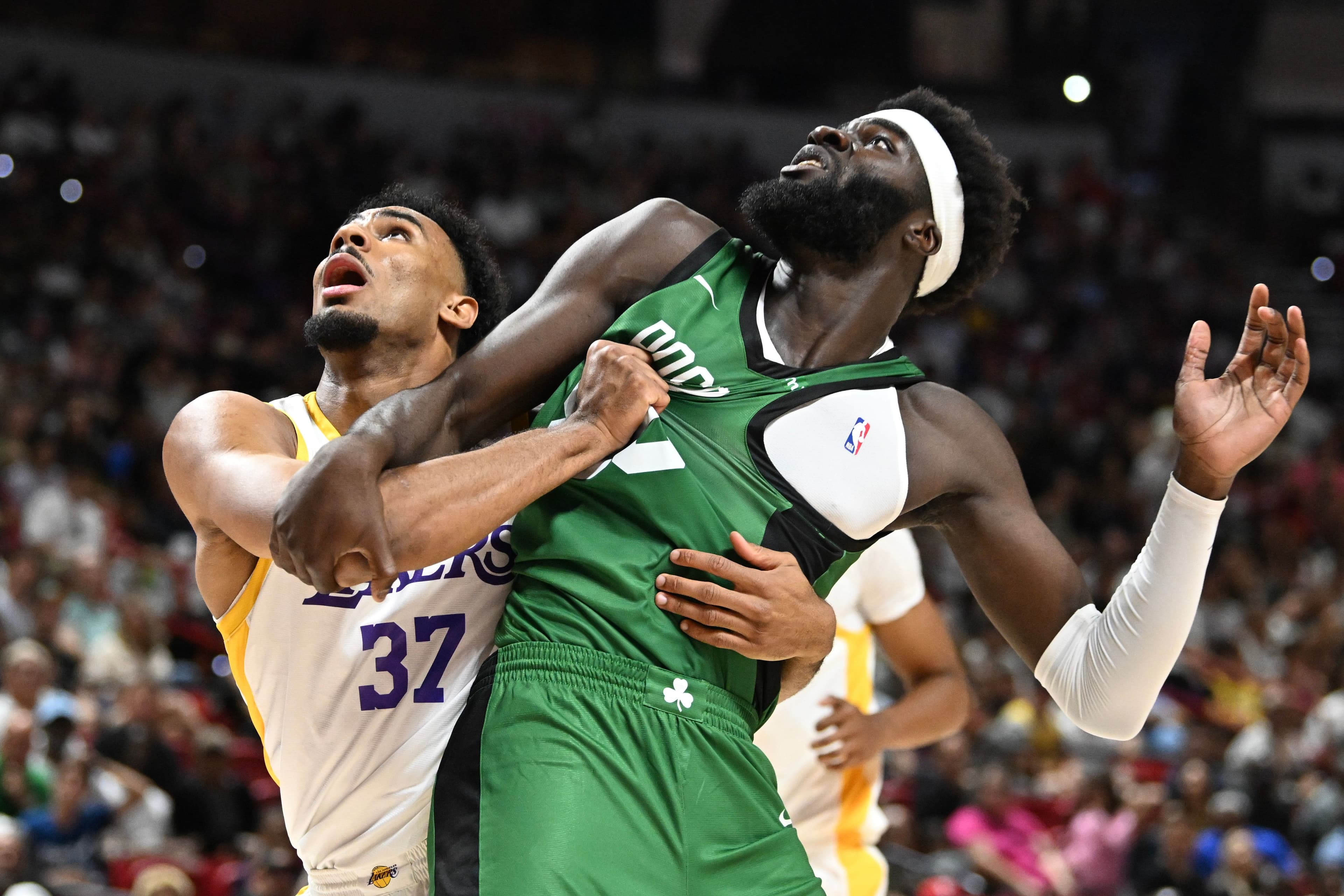NBA
The Greatest Team Rivalry in the NBA
Team rivalries in the NBA have been a common phenomenon across decades. The most heated rivalries involve teams such as Los Angeles Lakers, Boston Celtics, Detroit Pistons, Cleveland Cavaliers, Chicago Bulls, Golden State Warriors, etc.

Armel Traore//Getty Images
Some of the team rivalries in the NBA are historical and others have morphed up over the last decade, due to constant matchups at the grandest stage, which is the NBA Finals. NBA team rivalries have ignited unwavering passions and captivated fans, forming the heart and soul of the league. Over the years, these team rivalries have stood out, since they have defined eras and delivered entertaining matchups:
- Los Angeles Lakers Vs. Boston Celtics (Various Decades).
- Chicago Bulls Vs. Detroit Pistons (Michael Jordan’s Bulls vs the Bad Boy Pistons.
- Cleveland Cavaliers Vs. Golden State Warriors (2010’s rivalry featuring LeBron James vs Steph Curry).
- Los Angeles Lakers Vs. San Antonio Spurs (1990’s, 2000’s Gregg Popovich Vs Phil Jackson).
- Boston Celtics Vs. Philadelphia 76ers (1980’s Larry Bird vs Julius Erving)
All these rivalries have been impactful in the NBA, leaving compelling storylines. However, the greatest team rivalry is the Boston Celtics vs the Los Angeles Lakers.
This "Crème de la crème" of NBA rivalry has spanned through multiple decades and eras. Aside from being the two most successful teams among all the 30 NBA franchises, with a combined 35 NBA championships, these two storied franchises have collided in the NBA Finals a remarkable 12 times. The Celtics has won nine times and the Lakers has won just three times.
History of the Boston Celtics and Los Angeles Lakers Rivalry
The rivalry between these two franchises started in the late ‘50s, with Bill Russel and Bob Cousy going against Jerry West and Elgin Baylor, before the Lakers moved to the West. By the end of the ‘60s, the situation morphed into Russell versus Wilt Chamberlain. The 1970s witnessed a dry patch in the rivalry, as both franchises won titles during the decade. The 1980s was marked by Magic vs. Bird vengeance-oriented years, while the ‘90s turned into a nadir for both franchises. In the 2000s, the rivalry was rekindled later in the decade.
1950s and 1960s Eras
The NBA’s most fabled rivalry began in 1959, when the Boston Celtics swept the Minneapolis Lakers 4-0 in the NBA finals. This was the first sweep in the history of the NBA. Prior to this matchup, Lakers possessed the first dynasty in the NBA. The franchise won four NBA titles in the late 1940s through early 1950s, while being led by Hall of Fame head coach John Kundla and superstar big man George Mikan.
This Finals victory would mark the beginning of a dominant stretch of eight consecutive NBA titles for the Celtics.
The Lakers relocated to Los Angeles in 1960s, bringing the bright Hollywood light to its fold. The Celtics would however mop the Lakers, winning six NBA Finals series against them, in what would be the Celtic’s decade.
The Celtics, led by legendary head coach Red Auerbach and superstar center Bill Russell, won every NBA title in the 1960s expect the 1967 title. The Lakers superstar trio of Elgin Baylor, Jerry West and Gail Goodrich put up a fight but the Celtics were simply a better oiled machine of a team. They had selfless superstars like Tom Heinsohn, John Havlicek and Sam Jones complementing their defensive franchise superstar.
The Lakers acquired generational center, Wilt Chamberlain, in 1968, which brought the personal rivalry between him and Bill Russell, to the Celtics and the Lakers. The latter would dominate the league in the 1968/1969 season. This triggered a finals showdown against the Celtics, whose aging squad managed to upset conference favorites, New York Knicks and Philadelphia 76ers.
In a memorable seven game series, the Celtics upset the Lakers 4-3 and proceeded to win their 11th title in franchise history. It would be a major heartbreak for the Lakers faithful, as they experienced their bitter rivals hoist the Larry O’Brien trophy in their famous Los Angeles Forum. Suprisingly, the franchise’s superstar at the time, Jerry West, became the first player to be named NBA Finals MVP while representing the losing team in the Finals.
The 1970s saw the Celtics win two titles and the Lakers one, earlier in the decade. The rivalry was subtle due to the lack of matchups at the grandest stage.
1980s Bird’s Celtics and Magic’s Showtime Lakers
Luck would shine on these two storied franchises, as both would get the opportunity to draft colligate stars Larry Bird and Magic Johnson. The two had squared off in the NCAA championship game, with Magic leading Michigan State University to a 75-64 victory against Bird’s Indiana State University. Magic won the Most Outstanding Player of the Final Four, in what was the most-watched college basketball game ever.
Magic and Bird would spur each other to greatness, with both looking to outgun the other in accolades, performances and titles.
The Lakers would win the first championship in the decade, against the Philadelphia 76ers. The Celtics, on the other hand, won in the second championship game against the Houston Rockets. The 76ers would spoil a first matchup reunion of the Celtics and Lakers, eliminating the Celtics in the Eastern Conference Finals in 1982. Nonetheless, the Celtic faithful backed the 76ers, chanting “Beat LA”, clearly highlighting their distaste for their West Coast adversaries.
Lakers would however win the1982 finals but lose the 1983 finals to the Julius Erving led 76ers. The long awaited finals matchup would come in 1984, with the Celtics winning a grueling seven-game series against the Lakers.
Celtics made their 8-0 record against the Lakers in the finals series. The matchup was a back and forth affair with passion and tense flare-ups.
In 1985 the Lakers would finally break their Finals jinx against the Celtics, earning some sweet revenge winning the finals in six games. They became the first visiting team to win the Championship at the Boston Garden.
The famous "Beat L.A.!" chant, sung by fans in opposing arenas whenever a Los Angeles–based team plays, originated during Game seven of the 1982 Eastern Conference Championships at Boston Garden. It emerged when the Boston fans urged the victorious Philadelphia 76ers to win over L.A.
In 1986, Celtics would reclaim the title against the Houston Rockets before another finals matchup with the Lakers in1987 ensued. Lakers would win the series in six games and the Celtics would wait until 2008 to finally get back to the finals. The Lakers won the 1988 finals against the Pistons, before losing to the same Piston a year later.
The Magic-Bird feud brought the Lakers-Celtics rivalry to a new stratus. The rivalry took on race lines, with a majority of white fans supporting the Celtics, while blacks and minority races rallying behind the Lakers.
It also represented a clash of styles, with the Celtics blue collar grit known as the “Celtic Pride” often pitting against the Lakers Hollywood Flashiness nicknamed “Showtime Laker”.
2000’S Rivalry Renewed
The Lakers went on to win three championships at the beginning of the 2000s, with the dynamic duo of Shaquille O’Neal and Kobe Bryant. On the other end, the Celtics long-term rebuild continued proving disastrous and agonizingly painful, especially with the Lakers streak of success.
In 2008, the Celtics put up a roster capable of facing the challenge in the NBA championship, with a big-three: Paul Pierce, Kevin Garnett, and Ray Allen. The Lakers equally rode on the prime years of Kobe Bryant and mastermind head coach, Phil Jackson. The two teams would face off in the finals, where the Celtics dispatched off the Lakers in six games.
The Lakers would get back to the finals in 2009, this time eliminating the Orlando Magic, who had overcome the Celtics in the Eastern Conference Finals.
In 2010, the teams finally got a rematch against each other, with both teams tangling to a game seven winner takes all game. Game seven lived up to the billing, becoming the highest rated NBA game since Michael Jordan's second retirement in Game six of the 1998 NBA Finals.
The Lakers won Game seven against the Celtics for their very first time,. This brought the total number of NBA championships to 16, just one fewer than the Celtics' 17.
The rivalry continued into the next decade, although to mixed success, with both franchises taking a hiatus from the NBA finals due to the emerging Miami Heat and Golden State Warriors dynasties. Also, the Popovich led San Antonio Spurs and LeBron’s Cleveland Cavaliers proved to be a hard nut to crack.
The Lakers would win the 2020 NBA championship in the Orlando Bubble due to the Covid pandemic against the Miami Heat. The Heat had eliminated the Celtics in six games in the Eastern Conference finals, denying a Lakers-Celtics finals matchup.
In 2024, the Celtics beat the Mavericks, leading to a win in their 18th championship, finally breaking the tie with the Lakers.
This rivalry will continue gracing the NBA, with both franchises set in big market metropolitan cities and their brands growing to global prominence.
NBA Finals Matchups
| 1959 Finals | Celtics beat Lakers 4-0 |
| 1962 Finals | Celtics beat Lakers 4-3 |
| 1963 Finals | Celtics beat Lakers 4-2 |
| 1965 Finals | Celtics beat Lakers 4-1 |
| 1966 Finals | Celtics beat Lakers 4-3 |
| 1968 Finals | Celtics beat Lakers 4-2 |
| 1969 Finals | Celtics beat Lakers 4-3 |
| 1984 Finals | Celtics beat Lakers 4-3 |
| 1985 Finals | Lakers beat Celtics 4-2 |
| 1987 Finals | Lakers beat Celtics 4-2 |
| 2008 Finals | Celtics beat Lakers 4-2 |
| 2010 Finals | Lakers beat Celtics 4-3 |

Ian Mugo Wanyeki is based in Nairobi, Kenya. He is a sports enthusiast with vast knowledge of different sport disciplines. Ian is a graduate with a Bachelor’s of Science degree from Kenyatta University. He is a Kenyan journalist who’s worked as a sports analyst at Covenant Television Network, as a sports reporter at NTV and as a Sports Correspondent/contributor at Quartz Africa.